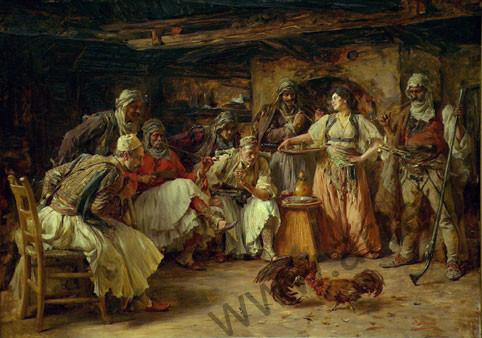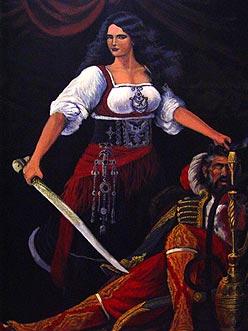Robert
Gesperrt



Nora of Kelmendi also called Helen of Albania or the Albanian Brunhilde was the one of the greatest female warriors in the history of Albania. There are two versions of Legend and both versions end with Nora killing the Pasha (a Bosnian man ) who has been documented to have been the leader of the Ottoman Army and who had taken a Public Oath to turn Malesia into ashes if Nora did not become his wife.
The events happened around 1620. Nora’s father, a Noble Fighter wanted a son to help him fight against the ottoman empire. When Nora, a girl was born, he took her to an orphanage in Shkodra and left her there. His sister, knowing the doings of her brother, took Nora back and raised her as a boy. Nora's biological father, having the desire to train some young man to become a fighter, decided to train the adapted “son” of his sister. Hence, unknowingly, he trained his own daughter to become a fighter. But there is no way to fight biology, so when Nora grew up, she become Malesia’s most beautiful women. It is said that she was as pretty as a true Zane (mountain fairy). Her fame spread through the whole country. The Pasha who resided at the Rozafati Castle in Shkodra, heard of her too. One day Nora came down to the city with her parents. The Pasha came out of Castle and saw her. He fell in love.
Initially, he wanted to marry her by the laws of the Albanian Kanun, which meant he would send a trusted man to Nora’s house and ask for her hand. However, Nora's family replied that the Albanian KAnun did not allow for marriages with non-Albanians. The Pasha was not used to being refused. He was quoted as stating "I'll burn all of Malesia to ashes he said, or Nora will become my wife".
That was not the first or the last time for someone to attempt to burn Malesia to the ground, so nobody was afraid of the threat. It was bound to happen either for taxes, solders or the refusal to recognize the Ottoman legal system, anyway. The Pasha was serious. He lead his huge army and besieged Malesia.
Nora had proved to be a warrior. As a young woman as she was, she had proved to be the noblest and the most beautiful girl of all, but life had thrown yet another challenge at her. She had to prove that she was wise too, for wisdom is the thing most appreciated by the people of Malesia. She devised the plan of how to kill the mad Bosnian Pasha.
This is what happened according to various Albanian Epics. Nora pretended to want to marry the Pasha without the permission of her family. Dressed in the traditional Xhubleta, she went to Pasha's tent. Seeing her, the Pasha fell on his knees and began to pray to the divinities believing she was a true gift from heaven, as a reward by the almighty Allah for his services to Him. Pasha ordered his troops to rest and prepare to go back to Shkodra. The solders were happy to lay down their spears.
While everything was quiet around the Pasha's tent, Nora pulled a dagger that her father had given to her, which he had gotten as a gift from his own father, who had gotten it as a gift from his own father and so on and so forth. The dagger was in the family longer than anyone could remember. It was used strictly in wars, that is to say, the dagger was used only as a weapon to kill the enemy. This time, though, it turned out to be a regular dagger, made of steel, by a smith in the Middle Ages. She stabbed the Pasha a few times, kicked him around the back of his head, and choked him a little so he would not scream. The Pasha fell on his Persian rug.
At that point Nora could no longer stab him for he was lying on the floor. Nora ran as planned, at this time the Malesors attacked the Ottomans army and destroyed them. The Pasha survived the stab wounds. He created his own special unit, and followed Nora to her home.
There is a second legend. In this legend, Nora never went to the tent, but as the men were fighting on one side and the Ottomans had stealthily attempted to attack surrounding villages, she led an army of 300 women against the Ottomans. It is said that Nora had a duel with Pasha and she killed him.In both versions, Nora kills the Pasha in a fair duel. And in both stories he is from Bosnia and is called Vutsi Pasha.
It is proven historically that around 1620, the Bosnian Pasha, Vutsi Pasha, lead an expedition against the malesors, and there are documents that state that a woman was one of the most distinguished warriors. Anyhow, both stories are interesting. They are both mixed in legends and history. The malesors are truly a people that are of worthy mention in any legend. For centuries they have fought the Turk, Slav and various would-be invaders. Nora is one of the heroines that has contributed to the illustrious legacy of the Malesors, and all Albanian people while at the same time, reminding them of what is to be done to those who would attempt to pillage and ransack them.











